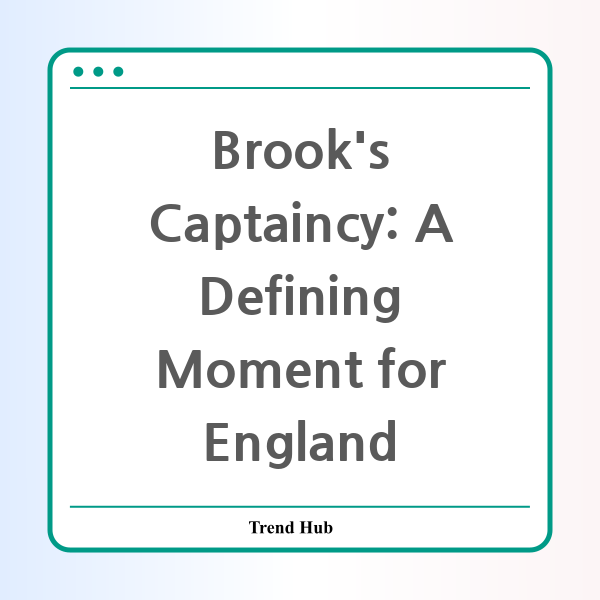* This website participates in the Amazon Affiliate Program and earns from qualifying purchases.

Could Harry Brook's potential captaincy redefine England's cricketing legacy? As the cricketing world buzzes with speculation following the abrupt resignation of England's white-ball captain, the spotlight shines brightly on Brook, a promising young talent. His possibility of stepping into this pivotal role presents both exciting opportunities and considerable challenges.
Following England's disappointing defeat to Afghanistan in Lahore, the narrative surrounding the team's leadership took a sharp turn. Brook, who has recently been named vice-captain, faces the daunting task of leading England in white-ball cricket without any clear precedent. His impressive performance in Test matches has raised expectations, but his white-ball track record remains a concern. With the upcoming fixtures, including an intensive schedule of 11 Tests and 27 one-day internationals, the question arises: is Brook ready to take on this monumental challenge?
At just 26 years old, Brook has emerged as the favorite candidate for captaincy, showcasing his leadership skills at various levels, including his stint with the England Under-19s and Yorkshire. However, the cricketer must balance an unprecedented workload, as commanding the team in both ODI and T20 formats while participating in all three formats is an unprecedented feat.
Despite Brook's prowess with a bat, averaging nearly 60 in Test cricket, his journey in limited-overs formats has been rocky. His performance at recent ICC events has raised eyebrows, as he has struggled to produce match-winning innings in high-pressure situations. Moreover, the packed schedule puts him in a precarious position; his commitments in the IPL and other tournaments may hinder his focus on the white-ball game.
The dual challenge facing both Brook and the management team, including coach Brendon McCullum and Rob Key from the ECB, is to ensure that Brook's batting doesn't suffer under the weight of captaincy. The last thing England can afford is for their leading batsman to become distracted and underperform as they gear up for significant international series, including the Ashes and a T20 World Cup.
Furthermore, should Brook be appointed, the need for a capable deputy is paramount. With limited alternatives on the horizon, this adds to the complexity of the decision-making process. McCullum's open-mindedness about potentially appointing different captains for ODI and T20 formats shows an understanding of the intricacies involved in leading a team through diverse formats.
As England's cricketing landscape evolves post-COVID, the mounting pressure on Brook to deliver becomes evident. The choice will not only impact his career trajectory but also dictate the legacy of McCullum and Key's time in charge. The upcoming conversations about leadership will determine whether Brook is equipped and ready for this unique situation, especially given the errors made in previous captaincy decisions.
In conclusion, Harry Brook’s anticipated captaincy could usher in a new era for England cricket, one that combines youthful vigor with seasoned leadership. However, it is crucial that both the player and the management team conduct due diligence before taking this leap, ensuring that England's cricketing ambitions are met with success rather than struggle. All eyes will be on Brook as this decision unfolds, potentially marking a turning point in England’s cricketing narrative.
* This website participates in the Amazon Affiliate Program and earns from qualifying purchases.